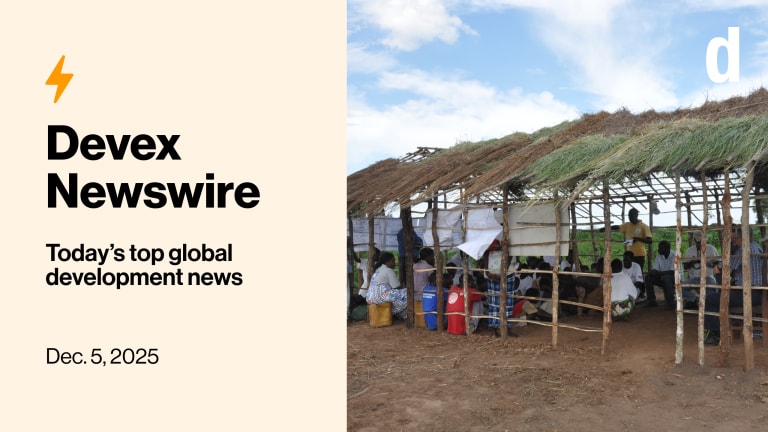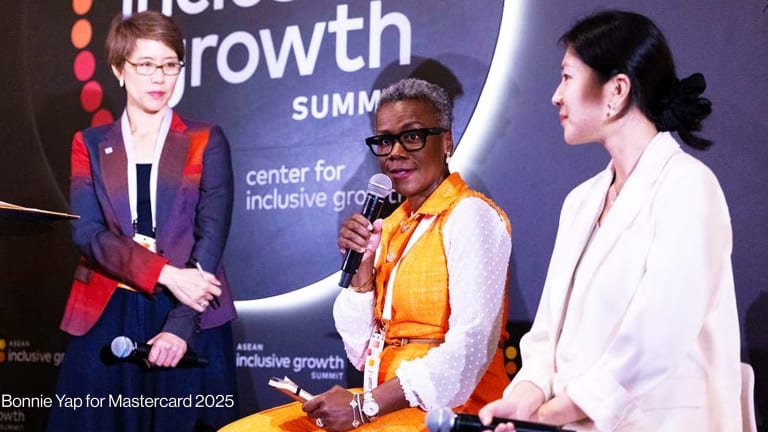
The Australian Red Cross’s global network is an increasingly important partner for Australia’s Department of Foreign Affairs and Trade in responding to emergencies, particularly in the Indo-Pacific. Their role is only likely to grow in the coming years. The region is predicting a rise in the frequency and intensity of natural disasters in the coming years, due to climate change.
At a workshop discussing the “Grand Bargain” in Melbourne on June 20, Peter Walton, international director for ARC, spoke with Devex about the organization's partnership with DFAT and how they are seeking to influence the localization agenda. Our conversation has been edited for length and clarity.
The Australian Red Cross has become an increasingly important partner for the Australian aid program in disaster response and preparedness for the Indo-Pacific region. How has this relationship developed?
ARC looks to improve localization in humanitarian response
With a localized research program, the Australian Red Cross is trying to suss out what exactly a localized disaster response would look like in the Pacific — with implications for a range of aid groups trying to figure out how to localize.
When you think about humanitarian action, especially across the Pacific, ARC and its partners play a massive role. National Red Cross Societies often partner with Pacific governments following any natural disaster.
We have been using our position to ramp up our own research and influence into ensuring the Australian contribution to natural disasters operates in a smarter and better way, so we are not making an isolated impact. We are focusing on best humanitarian outcomes and working with a range of partners, including DFAT as well as other governments, NGOs and private sector partners. If we are all working in parallel, the outcomes are suboptimal. This is a problem in life and death situations.
You are working on a range of new strategies to improve your capabilities and research. Can you discuss how these might influence or contribute to Australia’s aid program?
We are experimenting across a number of areas. We’re looking at how we engage with the legal profession in regard to international response laws and disaster risk reduction legislation. Some people in Vanuatu still can’t rebuild their houses after Tropical Cyclone Pam because they can’t prove land ownership. When disaster strikes, we want a legislative environment that encourages a good response and ability to rebuild.
We’re also looking at big data, the role of drones and rapid change detection, as well as better informed decision making through meteorological evidence. We’re looking at a whole range of ways that Australians respond, and making sure it is the right type of response. [We want] to reduce unsolicited donations that can clog up systems in countries trying to recover from a disaster.
See more related topics:
► Localization moves from advocacy to implementation in Indo-Pacific
► Opinion: Yes, the humanitarian sector really is going to localize
► Dispute over 'Grand Bargain' localization commitments boils over
And we are asking how can we make use of the data that already exists and align it much more closely with humanitarian decision making. Many of the things we are looking at can be considered part of a smarter system. We’re bringing together a range of impact partners — from government, the private sector and philanthropic organizations to design a smarter and more intelligent approach to disaster response. The key to this is data.
We hope our work is influencing DFAT. We’re pleased to see that research we are doing with the Humanitarian Advisory Group is influencing DFAT, including their working definition of localization, adopted from our research.
We’re sharing a lot of knowledge, which is healthy. No one has all of the answers. We’re putting together a hypothesis of a better system, but we are working it out as we go. We hope we can influence DFAT, but they and other partners can also influence us.
Your research indicates that Pacific Island responders have in the past felt shoved aside by international aid efforts. How will these findings shift the way your organization operates?
We have been operating with a humanitarian architecture that we have largely believed is OK but has been in place for decades. Now we are hearing that it is not always achieving what it intends to, and it is not valued in the way we think it is. This reflects on us, as well as Australia’s aid program.
“We know that there is going to be an increasing frequency and intensity of natural disasters … [so] we are also arguing that we don’t think the current system is fit for purpose.”
— Peter Walton, international director for ARCHow do we shift our international aid program and an organization such as ARC to focus on a new reality, in which humanitarian responses are led by local players? That is the shift we have to address through localization, and an issue we are pushing urgently.
We know that there is going to be an increasing frequency and intensity of natural disasters, and we know there are significant challenges for our immediate region — whether this is demographic, climate or otherwise. But we are also arguing that we don’t think the current system is fit for purpose. So this means change.
We’re looking internally at how we can fundamentally shift the humanitarian financing into disaster risk reduction and ensure we are spending money to reduce the impact of disasters. The localization agenda requires us to interrogate of our own methods to support these necessary changes in our humanitarian support.
The Grand Bargain has set deadlines for localization to be achieved in humanitarian responses by 2020. What timeframe would you be recommending to ensure it is done right and local players are supported?
It’s an interesting question, because the Red Cross, since its inception over 150 years ago, had localization at its core. Every Red Cross National Society in 190 countries across the world is a local organization, with local government and with a network of volunteers across the whole country or territory. So local is absolutely part of the Red Cross DNA.
Where we would like to see real change is looking at how we are better able to support the network of Red Cross organizations on the humanitarian mandate — looking at how donors are better able to assist with local civil society, private business and local government institutions to make sure the foundation is smarter and more collective.
Funding for humanitarian responses remains a challenge. How are you working to address and influence this discussion?
I still see the Grand Bargain as an equation in the overall problem, which includes funding. On one side is the need for more flexible funding. On the flipside is the reality that humanitarian players need to get their house in order. And it is connected to the localization debate.
Despite some increases in humanitarian funding, including here in Australia, it is not enough to respond to the need. By 2030, there will be 1 billion more people on a planet that is 1 degree warmer with antibiotic resistant diseases. We don’t have the resources to meet today’s needs, let alone anticipated needs.
At the same time, not being able to find better ways of using existing resources makes no sense to me — we absolutely have to be interrogating these as well. Strong leadership is going to be important in creating change and influencing others.
Read more international development news online, and subscribe to The Development Newswire to receive the latest from the world’s leading donors and decision-makers — emailed to you free every business day.








